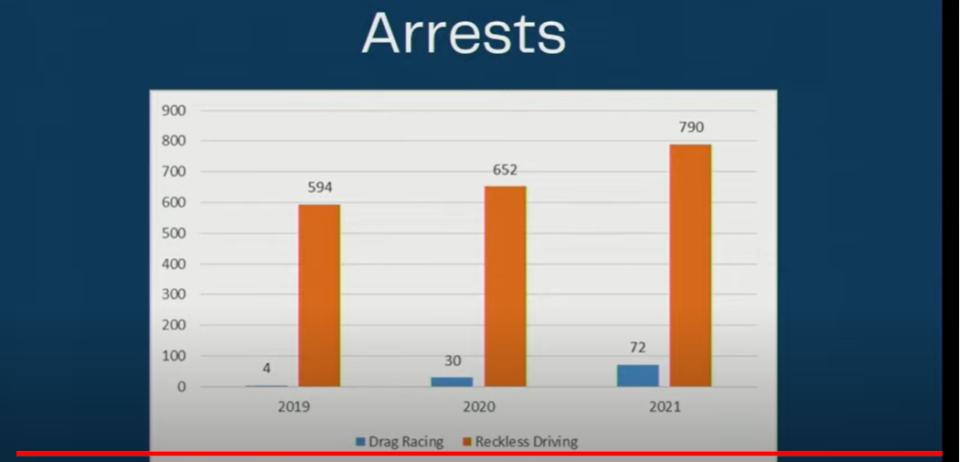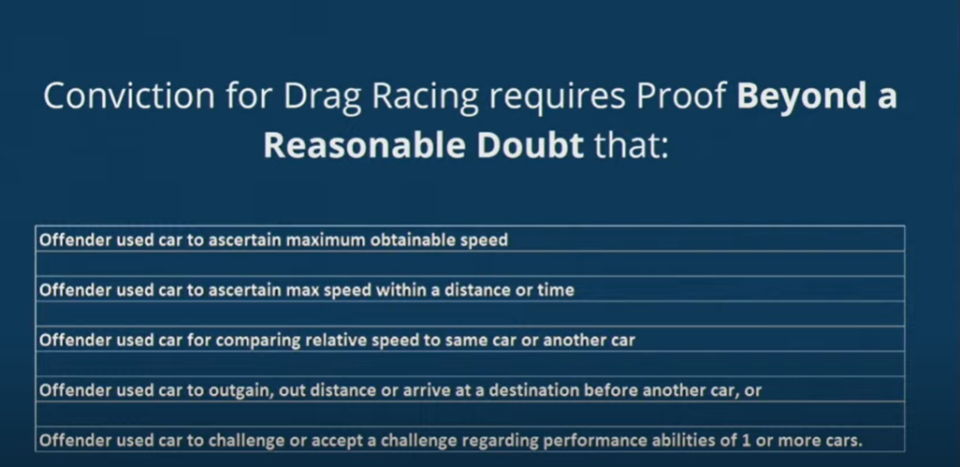Why is it so hard to keep dangerous drivers off of Memphis streets? The district attorney explains.
Shelby County's top prosecutor made an appearance before the Memphis City Council on Tuesday to detangle the myriad factors that must align before her office can charge an offender with drag racing — a societal risk that has been around almost as long as cars have.
Like other parts of the United States, Memphis is undergoing what feels like a surge in levels of reckless driving. Data that makes clear the increase in dangerous driving behavior is lagging — complete data sets around arrests, tickets, and fatalities run behind at least a year.
But for many, the level of dangerous driving in Memphis feels higher as of late, data or no data. The city's own top cop, Memphis police Chief C.J. Davis, has spoken several times on the subject.
Shelby County District Attorney Amy Weirich, appearing before the public safety and homeland security committee, explained the most common outcomes for charges of drag racing and reckless driving after a person is arrested or issued a misdemeanor citation are dismissals.
"There are a whole host of reasons why we as prosecutors dismiss cases, whether it's drag racing, murder, or anything in between," Weirich said. The number one reason is a lack of evidence.
"Just because an arrest is made and someone is charged with a crime, doesn't automatically transfer into a situation where we are able to proceed further."
Currently, Weirich's office has 56 pending drag racing cases compared to 1,044 reckless driving cases. Reckless driving, Weirich said, is rarely a standalone charge but often comes along with other charges.

If someone is arrested for driving while intoxicated, for example, they are automatically charged with reckless driving as well. And, when a reckless driving charge is tacked on to a slew of other high-level offenses, prosecutors will often drop the reckless driving charge so as to devote more resources to the more serious crime.
Drag racing, on the other hand, is a more specific charge. Not only do police have to physically apprehend an individual suspect — an already difficult task made more difficult by Memphis Police Department's chase policy — witnesses are still needed to testify towards the intention of the driver in order to help secure a drag racing conviction.

When it comes to confiscating an offender's car, officers are limited there as well, Weirich said. Cars cannot be confiscated unless or until there's a conviction for drag racing. Further, the offender has to be the sole owner of the car, Weirich said.
"And last but not least, law enforcement has to locate that car," Weirich said.
Offenders also have the legal option of dumping their car if they know a drag racing conviction is possible, whether they sell the car or let a relative or friend hold on to it.
After detailing the number of factors that have to align for drag racing convictions, Weirich said the best chances for real deterrents to drag racing would have to come from an overhaul of the highly technical state statute for what is considered drag racing.
"It is the very rare, if ever, case in which law enforcement comes upon individuals and a white flag and a line of drivers, like we see in the movies. And conversation and chat [about] 'Let's see how fast this car can go over the next 100 feet," Weirich said.
A possible fix Memphis and Shelby County's level of dangerous drivers, she said, is two-fold.
State lawmakers could upgrade the charge of reckless driving and drag racing. Currently, reckless driving is a class B misdemeanor.
"Change it to an 'E' felony. Change it to an 'A' misdemeanor. Make reckless driving a more serious crime in Tennessee," Weirich said.
As she's done in previous speaking engagements since announcing her bid for reelection this year, Weirich offered her input on how the state legislature could specifically intervene.
What could be most helpful in curbing the level of horsepower mayhem, Weirich said, is a change to state law that would allow police to immediately confiscate a vehicle from a driver caught in the commission of dangerous driving.
Two city councilors, Worth Morgan and Chase Carlisle, submitted follow-up questions for the district attorney general that centered around the limitations of Memphis and Shelby County government bodies.
Carlisle committed himself to following up on Weirich's "very concrete suggestions."
"I personally plan to pick up the phone and call our local representatives at the state level and see what we can do in this general assembly in this current session, to try and move state law to try and hold some of these offenders accountable," Carlisle said.
Micaela Watts is a reporter for The Commercial Appeal and can be reached at micaela.watts@commercialappeal.com.
This article originally appeared on Memphis Commercial Appeal: Drag racing and reckless driving is hard to prosecute in Shelby County

